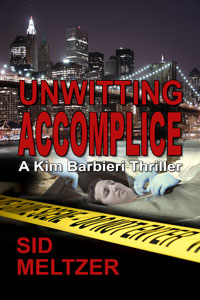Murder On The Metro
by Jon Land
March 1-31, 2021 Tour

Synopsis:
Israel: A drone-based terrorist attack kills dozens on a sun-splashed beach in Caesarea.
Washington: America awakens to the shattering news that Vice President Stephanie Davenport has died of an apparent heart attack.
That same morning, a chance encounter on the Washington Metro results in international private investigator Robert Brixton thwarting an attempted terrorist bombing. Brixton has no reason to suspect that the three incidents have anything in common, until he’s contacted by Kendra Rendine, the Secret Service agent who headed up the vice president’s security detail. Rendine is convinced the vice president was murdered and needs Brixton’s investigative expertise to find out why.
In Israel, meanwhile, legendary anti-terrorist fighter Lia Ganz launches her own crusade against the perpetrators of that attack which nearly claimed the lives of her and granddaughter. Ganz’s trail will ultimately take her to Washington where she joins forces with Brixton to uncover an impossible link between the deadly attack on Caesarea and the attempted Metro bombing, as well as the death of the vice president.
The connection lies in the highest corridors of power in Washington where a deadly plot with unimaginable consequences has been hatched. With the clock ticking toward doomsday, Brixton and Ganz race against time to save millions of American lives who will otherwise become collateral damage to a conspiracy destined to change the United States forever.
Praise :
"Jon Land is one of the best thriller writers in the business, and the Capital Crimes series is in superb and skilled hands with him. Nobody does pacing better than Land, and MURDER ON THE METRO starts with a bang and keeps on going at breakneck speed. If you haven't read this excellent series, start with Land's MURDER ON THE METRO." —Lisa Scottoline, #1 New York Times bestselling author
Book Details:
Genre: Thriller
Published by: Forge Books
Publication Date: February 16th 2021
Number of Pages: 288
ISBN: 1250238870 (ISBN13: 9781250238870)
Series: A Capital Crimes Novel, #32
Purchase Links: Amazon | Barnes & Noble | Goodreads
Read an excerpt:
CHAPTER 1
Washington, DC; the next morning
Not again . . .
That was Robert Brixton’s first thought when his gaze locked on the woman seated across from him in the Washington Metro car. He was riding into the city amid the clutter of morning commuters from the apartment in Arlington, Virginia where he now lived alone, his girlfriend Flo Combes having returned to New York.
Former girlfriend, Brixton corrected in his mind. And Flo’s return to New York, where she’d opened her first clothing boutique, looked very much like it was for good this time.
Which brought his attention back to the woman wearing a hijab and bearing a strong resemblance to another Muslim woman who’d been haunting his sleep for five years now, since she’d detonated a suicide bomb inside a crowded DC restaurant, killing Brixton’s daughter Janet and eleven other victims that day. He’d seen it coming, felt it anyway, as if someone had dragged the head of a pin up his spine. He hadn’t been a cop for years at that point, having taken his skills into the private sector, but his instincts remained unchanged, always serving him well and almost always being proven right.
But today he wanted to be wrong, wanted badly to be wrong. Because if his instincts were correct, tragedy was about to repeat itself with him bearing witness yet again, relocated from a bustling café to a crowded Metro car.
The woman wearing the hijab turned enough to meet his gaze, Brixton unable to jerk his eyes away in time and forcing the kind of smile strangers cast each other. The woman didn’t return it, just turned her focus back forward, her expression empty as if bled of emotion. In Brixton’s experience, she resembled a criminal who found strange solace in the notion of being caught after tiring of the chase. That was the suspicious side of his nature. If not for a long career covering various aspects of law enforcement, including a private investigator with strong international ties, Brixton would likely have seen her as the other passengers in the Metro car did: A quiet woman with big soft eyes just hoping to blend in with the scenery and not attract any attention to herself.
Without reading material of any kind, a cell phone in her grasp, or ear buds dangling. Brixton gazed about; as far as he could tell, she was the only passenger in sight, besides him, not otherwise occupied to pass the time. So in striving not to stand out, the young woman had achieved the opposite.
He studied her closer, determining that the woman didn’t look tired, so much as content. And, beneath her blank features, Brixton sensed something taut and resigned, a spring slowly uncoiling. Something, though, had changed in her expression since the moment their eyes had met. She was fidgeting in her seat now, seeking comfort that clearly eluded her.
Just as another suicide bomber had five years ago
If he didn’t know better, he would’ve fully believed he was back in that DC restaurant again, granted a second chance to save his daughter after he’d failed so horribly the first time.
***
Five years ago
What world are you in? Janet had asked a clearly distracted Brixton, then consumed by the nagging feeling dragged up his spine.
Let’s go.
Daddy, I haven’t finished!
Janet always called him “Daddy.” Much had been lost to memory from that day, forcibly put aside, but not that or the moments that followed. It had been the last time she’d ever called him that and Brixton had fought to preserve the recording that existed only in his mind resolvedly ever since. Whenever it faded, he fought to get it back, treating Janet’s final address of him like a voicemail machine message from a lost loved one forever saved on his phone.
Come on.
Is something wrong?
We’re leaving.
Brixton had headed to the door, believing his daughter was right behind him. He realized she wasn’t only when he was through it, turning back toward the table to see Janet facing the Muslim woman wearing the hijab who was chanting in Arabic.
Janet!
He’d started to storm back inside to get her when the explosion shattered the placid stillness of the day, an ear-splitting blast that hit him like a Category Five wind gust to the chest and sent him sprawling to the sidewalk. His head ping-ponged off the concrete, threatening his grip on consciousness. Parts of a splintered table came flying in his direction and he threw his arms over his face to shield it from wooden shards and other debris that caked the air, cataloguing them as they soared over him in absurd counterpoint. Plates, glasses, skin, limbs, eyeglasses, knives, forks, beer mugs, chair legs and arms, calamari, boneless ribs, pizza slices, a toy gorilla that had been held by a child a table two removed from where he’d been sitting with Janet, and empty carafes of wine with their contents seeming to trail behind them like vapor trails.
The surreal nature of that moment made Brixton think he might be sleeping, all this no more than the product of an airy dream to be lost to memory by the time woke. He remembered lying on the sidewalk, willing himself to wake up, to rouse from this nightmare-fueled stupor. The worst moment of his life followed the realization that he wasn’t asleep and an imponderable wave of grief washed over him, stealing his next breath and making him wonder if he even wanted to bother trying for another.
Brixton had stumbled to his feet before what moments earlier had been a bustling café filled with happy people. Now, bodies were everywhere, some piled on top of others, blood covering everything and everyone. He touched the side of his face and pulled bloody fingers away from the wound. He looked back into the café in search of his daughter but saw only a tangle of limbs and clothing where they’d been sitting.
“Oh, my God,” he whispered, his senses sharpening. “Janet!”
Washington’s Twenty-third Street had been crammed with pedestrians at the time of the blast, joined now by people pouring out of office buildings and other restaurants nearby, within eye or earshot of the dual blasts. Brixton’s attempts to get closer to the carnage, holding out hope Janet might still be alive, were thwarted at every turn by throngs fleeing in panic in an endless wave.
“My daughter! My daughter!” he kept crying out, as if that might make the crowd yield and the chaos recede.
***
It wasn’t until Brixton reached the hospital that he learned Janet hadn’t made it out, had been declared one of the missing. Having served as an agent for a private security agency out-sourced to the State Department at the time, he knew all too well that missing meant dead. He had another daughter, Janet’s older sister, who’d given him a beautiful grandson he loved dearly, but that was hardly enough to make up for the loss of Janet. And the guilt over not having dragged her out with him when she’d resisted leaving had haunted him to this very moment, when instinct told him many on this crowded subway car might well be about to join her.
Thanks to another woman wearing a hijab, but it wasn’t just that. Brixton had crossed paths with an untold number of Arab women in the five years since Janet’s death, and not one before today had ever elicited in him the feeling he had now. She might’ve been a twin of the bomber who’d taken his daughter from him, about whom Brixton could recall only one thing:
Her eyes.
This woman had the very same shifting look, trying so hard to appear casual that it seemed she was wearing a costume, sticking out to him as much as a kid on Halloween. Brixton spun his gaze back in her direction, prepared to measure off the distance between them and how he might cover it before she could trigger her explosives.
But the young woman was gone.
Brixton looked down the center aisle cluttered with commuters clutching poles or dangling hand-hold straps. He spotted the young woman in the hijab an instant before she cocked her gaze briefly back in his direction, a spark of clear recognition flashing when their eyes met this time.
She knows I made her, Brixton thought, heavy with fear as he climbed to his feet.
He started after her, heart hammering in his chest, the sensation he was feeling in that dreadful moment all too familiar. He couldn’t help but catalogue the people he passed in the woman’s wake, many of whom were either his late daughter’s age or younger. Smiling, gabbing away on their phones, reading a book, or lost between their earbuds without any knowledge of how horribly their lives might very well be about to change. If he needed any further motivation to keep moving and stop the potential suicide bomber though any means necessary, that was it. Doubt vanished, Brixton trusting his instincts in a way he hadn’t that tragic day five years ago when he was still a de facto agent for the US government.
Janet . . .
In Brixton’s mind, this was no longer a Metro car, but the same restaurant where a suicide bomber had taken a dozen lives and wounded dozens more. And he found himself faced with the chance to do today what he hadn’t done five years ago.
Stop!
Had Brixton barked that command out loud, or merely formed the thought in his head. Other passengers were staring at him now, his surge up the aisle disturbing the meager comfort of their morning routine.
Ahead of him, the woman wearing the hijab had picked up her pace, Brixton spotting her dip a hand beneath a jacket that seemed much too heavy for the unseasonably mild Washington, DC spring. His experience with the State Department working for the shadowy SITQUAL group, along with that as a cop, told him she was likely reaching for the pull cord that would detonate the suicide vest concealed under bulky sweatshirt and jacket.
If you could relive the day of your daughter’s death, what would you do?
I’d shoot the bitch before she had the chance to yank that cord, Brixton thought, drawing his Sig Sauer P-226 nine-millimeter pistol. It had survived his tenure with SITQUAL as his weapon of choice, well balanced and deadly accurate.
He could feel the crowd around him recoiling, pulling back, when they saw the pistol steadied in his hand. Several gasped. A woman cried out. A kid dropped his cell phone into Brixton’s path and he accidentally kicked it aside.
“Stop!”
Shouted out loud for sure this time, the dim echo bouncing off the Metro car’s walls as it wound in thunderous fashion through the tube. The young woman in the hijab was almost to the rear door separating this car from the next. Brixton was close enough to hear the whoooooshhh as she engaged the door, breaking the rule that prohibited passengers from such car-hopping.
“Stop!”
She turned her gaze back toward him as he raised his pistol, ready to take the shot he hadn’t taken five years ago. Passengers cried out and shrank from his path. The door hissed closed, the young woman regarding him vacantly through the safety glass as she stretched hand out blindly to activate the door accessing the next car back.
And that’s when she stumbled. Brixton was well aware of the problems encountered by this new 7000 series of Metro railcars after federal safety officials raised repeated concerns about a potential safety risk involving the barriers between cars that were designed to prevent blind and visually impaired people from inadvertently walking off the platform and falling through the gap. The issue initially was raised by disability rights advocates, who argued the rubber barriers were spaced too far apart, leaving enough room for a small person to slip through.
The young woman wearing the hijab was small. And she started to slip through.
Brixton watched her drop from sight an instant before an all-too familiar flash created a star burst before him. He felt light, floating as if there was nothing beneath his feet, because for a moment there wasn’t. The piercing blast that buckled the Metro car door blew him backward, the percussion lifting him up and then dropping him back down, still in motion sliding across the floor amid a demolition derby of commuters crashing into each other, as the train barreled along. Separated now from its rear-most cars, what remained of the train whipsawed through the tube with enough force to lift this car from the rails and send it alternately slamming up against one side and then the other.
Brixton maintained the presence of mind to realize his back and shoulders had come to rest awkwardly against a seat, even as the squeal of the brakes engaging grew into a deafening wail and his eyes locked on the car door that to him looked as if someone had used a can opener to carve a jagged fissure along the center of its buckled seam. The car itself seemed to be swaying—left, right, and back again—but he couldn’t be sure if that was real or the product of the concussion he may have suffered from the blast wave or upon slamming up against the seat.
Unlike five years ago, Brixton had come to rest sitting up, staring straight ahead at the back door of the Metro car currently held at an awkwardly angled perch nearly sideways across the tracks. He realized that through it all he’d somehow maintained grasp of his pistol, now steadied at the twisted remnants of the Metro car door as if he expected the young woman to reappear at any moment.
Janet . . .
A wave of euphoria washed over Brixton as, this time, he thought he’d saved her, making the best of the do-over fate had somehow granted him. The Metro car floor felt soft and cushiony, leaving him with the dream-like sense he was drifting away toward the bright lights shining down from the ceiling.
And then there was only darkness.
***
Excerpt from Murder on the Metro by Jon Land. Copyright 2021 by Jon Land. Reproduced with permission from Jon Land. All rights reserved.
Author Bio:

JON LAND is the USA Today bestselling author of over fifty books, including eleven in the critically acclaimed Texas Ranger Caitlin Strong series, the most recent of which, Strong from the Heart, won the 2020 American Fiction Award for Best Thriller and the 2020 American Book Fest Award for Best Mystery/Suspense Novel. Additionally, he has teamed up with Heather Graham for a science fiction series that began with THE RISING (winner of the 2017 International Book Award for best Sci-fi Novel) and continues with BLOOD MOON. He has also written six books in the Murder, She Wrote series of mysteries and has more recently taken over Margaret Truman's Capital Crimes series, beginning with Murder on the Metro in February of 2021. A graduate of Brown University, he received the 2019 Rhode Island Authors Legacy Award for his lifetime of literary achievements. Land lives in Providence, Rhode Island.
Catch Up With Jon Land:
jonlandbooks.com
Goodreads
BookBub
Instagram
Twitter
Facebook
Tour Participants:
Visit these other great hosts on this tour for more great reviews, interviews, guest posts, and giveaways!
Enter To Win!:
This is a rafflecopter giveaway hosted by Partners in Crime Virtual Book Tours for Jon Land. There will be 2 winners of one (1) Amazon.com Gift Card each. The giveaway begins on March 1, 2021 and runs through April 2, 2021. Void where prohibited.

























